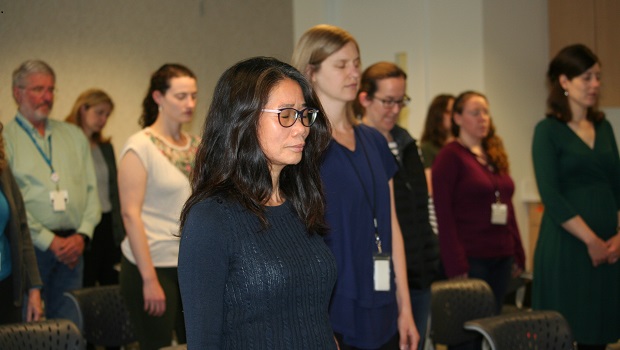Mindfulness: Practicing what we preach (and study)

We don't just do research on mindfulness. We encourage our employees to practice it. Dr. Jennifer McClure explains.
By Jennifer McClure, PhD, Kaiser Permanente Washington Health Research Institute (KPWHRI), senior investigator and director of research, faculty & development
Mindfulness has become the buzz word du jour. It’s hard to turn on the TV or open a magazine without hearing celebrities, corporate leaders, or spiritual teachers praise its benefits and share their secrets for how you, too can live a more mindful life. It almost sounds like mindfulness is a cure-all—the key to a less stressful, healthier, and happier life. And you know what? As much as that sounds like hype, there’s actually some truth to it.
What is mindfulness?
Jon Kabat-Zinn created the Mindfulness-Based Stress Reduction (MBSR) program while at the University of Massachusetts. He defined mindfulness as “the awareness that arises through paying attention on purpose, in the present moment, non-judgmentally, and sometimes in the service of self-understanding and wisdom.”
Truly being aware of the present moment and giving it your undivided attention is harder than it sounds. It takes training (which is why meditation is considered something you practice, not something you master). To be fully aware of the present moment—including all of the thoughts in your head, sensations in your body, and the symphony of sights and sounds around you—without being judgmental or critical of yourself or others is also really difficult. It’s a skill that most of us must cultivate over time, but the mental investment can pay huge dividends.
Benefits of mindfulness
Mindfulness has a strong empirical basis, especially the MBSR program developed by Kabat-Zinn. Research shows that being more mindful has both positive mental and physical health benefits, including reduced stress, anxiety, burnout, chronic pain, and symptoms of chronic illness. Being mindful is also associated with improved focus and creativity, greater job satisfaction and engagement, increased stress resilience, and greater immune functioning. My colleagues from the Fred Hutchinson Cancer Research Center and I have even found that Acceptance and Commitment Therapy, a form of mindfulness practice, may be a useful tool to help people stop smoking when delivered as an online intervention or in group counseling sessions.
Practicing what we preach (and study)
Given all of these benefits, it’s easy to understand why we don’t just study mindfulness at Kaiser Permanente Washington Health Research Institute (KPWHRI). This summer we also hosted a series of trainings with the regional organization Mindfulness Northwest. The trainings were to teach KPWHRI employees some basic mindfulness exercises and encourage them to practice them as part of their daily routine. Our goal: To help our coworkers better manage the stress of our daily (professional and private) lives.
Initial feedback on the introductory trainings was very positive. Three-quarters of those surveyed rated the training as “excellent” or “very good” and more than 80 percent said they were likely to use the skills they learned. Others were pleased to have an opportunity to learn some of the techniques used in research studies they’ve worked on at KPWHRI.
All in all, it was good experience and one that I hope we can offer again in the future. It’s important that we not only study but also promote ways to improve health and wellbeing at KPWHRI. I’m proud to work for a health care organization that allows us to walk our talk.
Resources
If you would like to learn more about mindfulness, here are some resources to consider:
- Basics of Mindfulness Practice: Learn more about basic mindfulness and mindful meditation practices from the Foundation for a Mindful Society.
- Mindfulness Classes: Find a range of trainings and classes in Western Washington at Mindfulness Northwest and their class schedule.
- How Mindfulness Transforms Us: Learn more about mindfulness and what it can do for you with this Tedx Talk by Jo Pang, Slalom Consulting.
- MBSR: Learn more about MSBR without taking a multiweek class with these resources.
- Guided Mindfulness Meditation Practices products from Kabat-Zinn
- “Defining Mindfulness” interview of Kabat-Zinn with links to four guided meditations
- Mindfulness Mediation: For more guidance in mindful meditation, check out these great resources from author and teacher Pema Chödrön.
healthy findings blog

Can being accepting and mindful help you stop smoking?
Tobacco remains a public health priority. Jennifer McClure, PhD, discusses her findings comparing ’acceptance and commitment therapy’ to standard care.

Meditating: Easier — and more beneficial — than you think
Everyone from the Seattle Seahawks to Ellen DeGeneres does it. Linda Kiel explains why meditating is worth trying and how easy it is to start.


